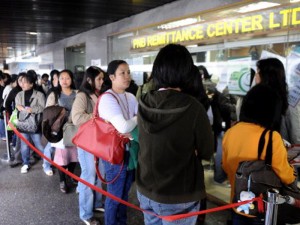
Filipino domestic helpers line up to send money at a remittance center in the central district of Hong kong on November 30, 2008. Remittances sent home by overseas Filipino workers grew 6.2 percent to $1.78 billion year on year in October. The total for the first 10 months of the year reached $16.53 billion, up 7 percent from a year ago, the central bank said. AFP PHOTO/TED ALJIBE
MANILA, Philippines—Remittances hit a record high $1.777 billion in October as global demand for Filipino workers remained robust despite economic woes in Western industrialized countries that host many migrants, the Bangko Sentral ng Pilipinas reported yesterday.
The BSP also said that remittances in October marked a 6.2-percent increase from the $1.674 billion in remittances in the same month last year.
For the January-to-October period, the total amount of money sent by Filipinos based offshore amounted to $16.53 billion, an increase of 7 percent from $15.46 billion in the same period last year.
“Despite the challenges posed by global economic and financial head winds, the continued strong demand for Filipino workers abroad, particularly skilled manpower, provided support to the stream of remittance flows over the 10-month period,” the central bank said in a statement.
Citing data from the Philippine Overseas Employment Administration, the number of approved job orders for Filipino workers from January to November this year reached 645,775, which was higher by 12 percent from 578,535 in the same period last year.
The employment data gave comfort that remittances would continue to be strong in the months ahead, the BSP said.
Besides rising demand for Filipino workers, moves of many migrants to send more money to their families affected by Typhoons “Quiel” and “Pedring,” which hit the country in the latter part of September, led to the rise in remittances.
“The continued expansion in the number of banks, other financial institutions and telecommunication companies that offer a wide range of money transfer services and financial products has also encouraged higher remittances from overseas Filipinos,” the central bank said.
Remittances from Filipino migrants, which are estimated to be around 10 million, are expected to continue boosting overall consumption within the domestic economy.
Since remittances help fuel consumption, which is a key growth driver, these are closely watched economic indicator.
According to the BSP, remittances for the full year could reach at least $20.1 billion, which would be up 7 percent from last year’s $18.8 billion.
This should provide support to the overall economy through the consumption channel, it added. The BSP said, however, that other sources of growth should be maximized to complement the rise in remittances.
Although remittances and personal consumption have been strong this year, the economy grew by a mere 3.6 percent in the first three quarters. The growth figure made it unlikely for the economy to reach the full-year target of 4.5 to 5.5 percent, officials admitted.
Economists blamed the slower-than-expected growth in January to September on anemic public spending and a decline in demand for the country’s exports that was brought by the crisis in the eurozone and the sluggish performance of the US economy.